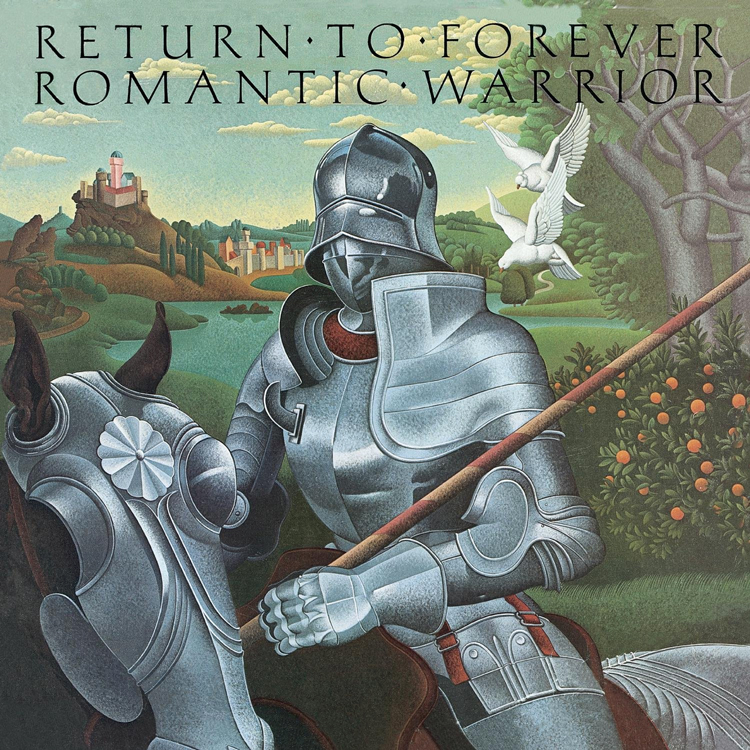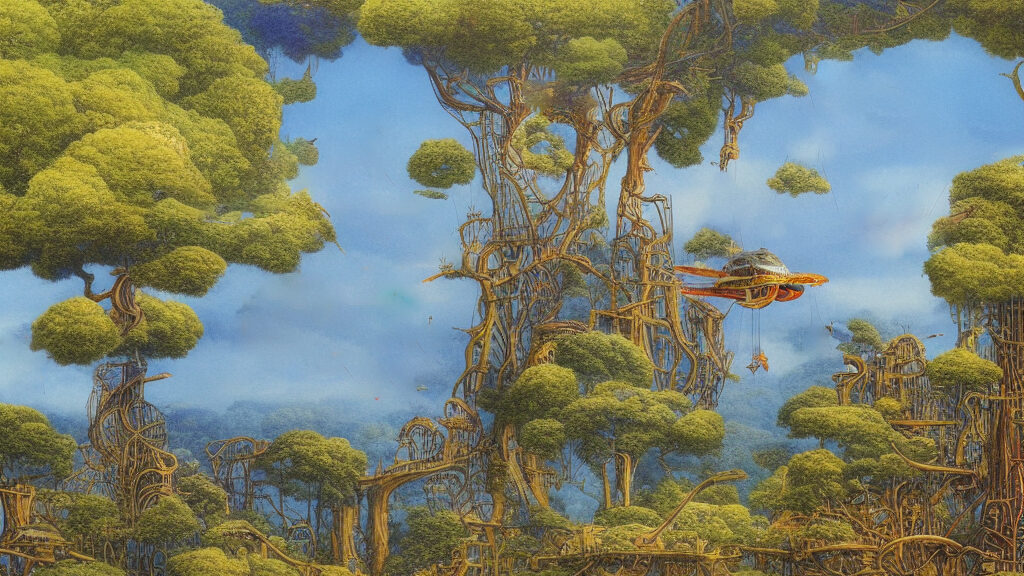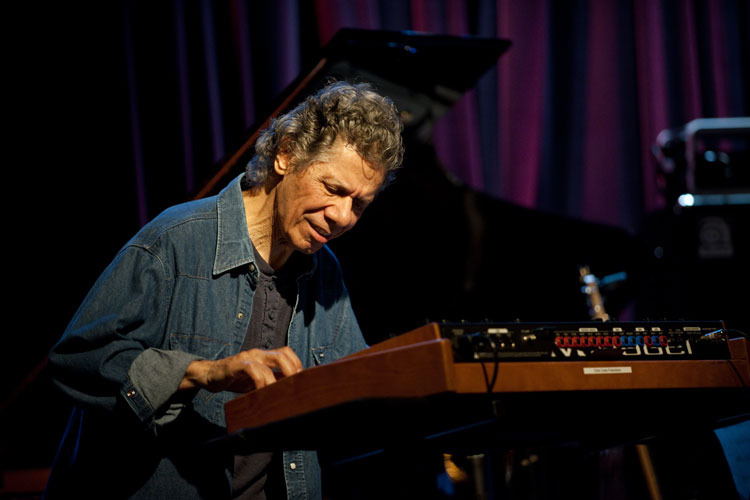Born Armando Anthony Corea in Chelsea, Massachusetts on June 12, 1941, Chick Corea was studying piano by age four and enjoyed a childhood home filled with the sounds of Charlie Parker, Dizzy Gillespie, Bud Powell, Lester Young and Horace Silver, as well as Beethoven and Mozart who inspired Chick’s music.
Chick’s earliest compositions were recorded during one of his first professional jobs, three years with trumpeter Blue Mitchell (1964-1966) which led up to the pianist’s first project as a leader, Tones For Jones Bones.
Early gigs with Willie Bobo, Cal Tjader, Herbie Mann, and Mongo Santamaria instilled a love of Latin music prevalent in much of Chick’s early work. After a year accompanying Sarah Vaughan he rose to true prominence in the jazz world by joining Miles Davis’ band playing electric piano. In his years with Miles, Chick played on the groundbreaking classic fusion recording Bitches Brew and In a Silent Way. From there, Chick formed his own avant-garde improvisational group Circle with bassist Dave Holland drummer Barry Altschul and saxophonist Anthony Braxton.
In 1971, after three years of Circle, Chick changed his focus. Jazz has never been quite the same since the birth of Return to Forever. The early edition of that group (which featured the young Stanley Clarke on bass) was a softer samba-flavored ensemble featuring Flora Purim on vocals, her husband Airto Moreira on drums and reedman Joe Farrell. After two albums with this lineup and a few solo piano released on the side, Chick plugged in and went the electronic fusion route incorporating into Return to Forever the firepower of drummer Lenny White and guitarist Bill Connors.
While Corea was forging a unique style on the Moog synthesizer, Return to Forever (with Al Di Meola replacing Connors) spearheaded the mid-1970s fusion movement with such innovative albums as Where Have I Known You Before, the Grammy-winning No Mystery, and Romantic Warrior. When Return to Forever disbanded in 1975, Corea delved into a diverse series of recordings — electronic ensembles, solo piano, classical music and high-powered acoustic duos — with artists like Herbie Hancock and Gary Burton.

Other Corea projects leading up to his mid-80’s formation of the Elektric Band were the Grammy winning The Leprechaun, My Spanish Heart, and Musicmagic (the latter of which was a new Return to Forever project with vocalist Gayle Moran) followed by The Mad Hatter, Return To Forever – Live, and work with Joe Henderson, Freddie Hubbard, Hubert Laws, Chaka Khan and Nancy Wilson among countless others.
In 1992, Chick realized a lifelong goal along with manager Ron Moss forming Stretch Records, a label committed to stretching musical boundaries (like its founder) and focusing more on freshness and creativity than on musical style. Among its early releases were projects by Bob Berg, John Patitucci, Eddie Gomez and Robben Ford.
“My interests change and vary as the years go along with different emphases all the time ” Chick mused. “The more I play in different situations the more possibilities I discover for what I can do. Rather than think in terms of my music developing I choose to bask in the glow of one thing for a few minutes then let it go.”
In 1996, as the last release for GRP Records, Ron Moss produced Music Forever and Beyond: The Selected Works of Chick Corea, a 5 disc box set of selected works from 1964-1996. Corea stated “The single emotion that this box set has left me with is a profound feeling of gratitude and thankfulness to have had the opportunity and the honor to create music with so many inspiring musicians through the years.”
After his relationship with GRP ended in 1996 Stretch Records became a subsidiary of Concord Records and Chick decided to be part of Stretch’s artist roster.
His first release on Stretch was a tribute to pianist Bud Powell. Therefore it was suitable to contact Roy Haynes to be a part of this project as Haynes had performed with Powell in the early 60’s. Remembering Bud Powell was met with much excitement due in part to the participants that Corea had on the project. Along with Haynes were Kenny Garrett Joshua Redman Wallace Roney and Christian McBride. Corea said “All the musicians poured themselves so unselfishly and creatively into this project…we all felt Bud’s lasting inspiration during the recording and touring.”
That same year Chick released a recording with the St. Paul Chamber Orchestra, with Bobby McFerrin as conductor. This was their 2nd recording for Sony Classical entitled The Mozart Sessions. Their first duet recording Play was honored with a Grammy Award.
Also in 1997, Chick teamed up with Gary Burton. It had been over 2 years since their Crystal Silence collaboration and the two thought it was time to do another. Native Sense: The New Duets was released on Stretch Records and gave Chick his 9th Grammy Award in 1998.
Moving forward is something at which Chick was well adept. Toward the end of 1997, Chick decided to once again form a new group – a base in which he could once again perform on acoustic piano. The band’s self titled debut release was a live recording at the Blue Note club in New York City. Chick’s strategy behind the recording was to try to capture the band’s sound and feel as it is in a live performance. “When we play to an audience as opposed to playing in a recording studio there’s never a thought of playing perfectly or making no mistakes ” Chick commented “so the music flows more freely and there comes a comfort in stretching out. So what you hear on that recording is the unedited performances.”
Those shows generated so much enthusiasm that the veteran bandleader took another leap after the initial release of Origin: Live At The Blue Note. In 1998 Chick released the six-disc set Week at the Blue Note. The boxed set featuring music played during three of the four evenings that heralded the debut of “Origin ” caught the band in all its spontaneously combustible glory.
The sextet took on Miles Davis’ “Four” Thelonious Monk’s “Blue Monk” “Straight No Chaser” and “Four in One” Bud Powell’s “Tempus Fugit” Charlie Parker’s “Bird Feathers” the Rodgers-Hart standard “Bewitched Bothered & Bewildered” and Corea’s “Matrix” “Hand Me Down” and “Sifu” not to mention alternate versions of tunes heard on the first album.
In the summer of 1999, Chick released Origin’s 3rd recording Change. This was recorded within the relaxed confines of the home Chick shares with singer and wife Gayle Moran in Florida. Chick and the band went to work on a set of material written specifically for Origin since the release of the debut.
“The first record was a mishmash of all kind of stuff; old tunes standards jam-session tunes and new written music whereas Change is focused on music specifically written for a known group that has become an entity. With this record I wanted to try more thorough writing with the band. Everyone responded to it very well.”
Change brought Origin one step closer to Chick’s conception of a dream ensemble a group of musicians unusually attuned to each other’s playing united under the like-minded goal of bringing to life the music of a leader able to compose and arrange challenging material with specific instrumental voices in mind.
Chick completed a recording with the London Philharmonic Orchestra Corea, Concerto, for Sony Classical released October 1999. Back in the early ’80s Chick was introduced to Mozart’s music by Friedrich Gulda. Since then Chick was determined to write a Piano Concerto of his own. This was completed in 1984. Over a 10 year period Chick performed the piece with various orchestras in New York Japan and Italy but had not had the opportunity to record it. In 1998 Chick was invited to perform in Vienna with the London Philharmonic Orchestra for a special 1999 Easter event. This concert opened up an opportunity to record the Concerto. After a successful evening in Vienna Chick group members from Origin and the London Philharmonic Orchestra went back to London to do the recording.
Besides first-hand encounters with Trane and Montgomery whose album Grooveyard had “an enormous influence” on Martino he also cites Johnny Smith a Stan Getz associate as an early inspiration. “He seemed to me as a child to understand everything about music ” Pat recalls.
“I chose almost the exact same instrumentation as the Mozart piano concerto orchestrations for my concerto. I figured that I could perform the Mozart and my own piece with the same size orchestra and that would be a good practical start for me. So with the spirit and sound of Mozart’s piano concerto music I wrote this piece and dedicated it to the spirit of religious freedom which for me is on the same level as the creative freedom that is the basic right of all people.”
Chick also speaks about why he chose to do a new version of Spain “If there is any one song that listeners seem to know me best by I guess that song is “Spain” as I get the most requests for it and hear it mentioned more than any of the others. I wrote the song in 1971 and played it frequently with Return To Forever and many other bands of mine. I reharmonized the theme and made a brand new arrangement of it for the Akoustic Band trio in 1988 and have generally turned the song inside out through the years. This is a final visit to “Spain” in grand fashion and with a tip of the hat to the art cultures of Spain, Cuba, Brazil, Argentina and New York.”
His releases in 2000 were two solo piano CDs titled Piano Standards & Solo Piano-Originals. The recordings came from 10 concerts throughout Europe and Japan during his touring in 1999.
Corea stated about these releases “I played in such varied environments from clubs to concert halls – it taught me some very new lessons in musical communication and especially verified how the communication of music lives absolutely far above all other human differences such as language religion race culture age sex politics etc etc“.
At the end of 2000, The Chick Corea New Trio was formed with Origin rhythm section of Avishai Cohen and Jeff Ballard. Their recording Past Present & Futures embodied all new Corea compositions except for Fats Waller’s “Jitterbug Waltz”. The Trio’s year tour has generated excitement with sold out crowds from as far as Russia, Japan, South America, Europe as well as at home in the U.S.A.
2001 marked Corea’s 60th birthday year. The Blue Note in New York asked him to celebrate this birthday at their club for an unprecedented 3 week appearance in December. Corea put together 9 different bands for the historical event. He reunited with old and new friends in the form of duets trios and larger ensembles. Duets were with Bobby McFerrin Gary Burton and Gonzalo Rubalcaba. The trios consisted of his New Trio and reunions with Akoustic Band mates Dave Weckl & John Patitucci and of course the Now He Sings Now He Sobs trio with Roy Haynes and Miroslav Vitous. The larger ensembles were Origin Remembering Bud Powell Band with Haynes, Joshua Redman, Christian McBride, and Terence Blanchard and event concluded with the Three Quartets ensemble of Michael Brecker, Steve Gadd & Eddie Gomez. The sold out 3 week event was filmed and recorded. The double CD/SACD is titled Rendezvous in New York.
In 2005 Corea performed in New York City at the Blue Note with the core members of the renowned flamenco guitarist Paco de Lucia‘s band Corea revisited the heart of his Spanish-influenced compositions from his classic Touchstone album and continued his flamenco-based explorations with new music for the stellar quintet. Throughout his four-decade career he has constantly sought inspiration from his Castilian heritage.
Chick Corea joined bassist Eddie Gomez and the late drummer Paul Motian to release on Further Explorations (CRE-33364-2) a two-CD live set of 19 tracks released January 17, 2012 on Concord Jazz. Produced by Corea Further Explorations is a tribute to Bill Evans and was recorded May 4-17, 2010 live at the Blue Note in New York City. Disc 1 includes “Peri’s Scope “from Evans’ LP Portrait in Jazz “Gloria’s Step “a Scott LaFaro classic from Evans’ LP Sunday at the Village Vanguard and Irving Berlin’s “They Say That Falling in Love Is Wonderful “from the Broadway show Annie Get Your Gun.
Other pieces include Sammy Fain and Bob Hilliard’s “Alice in Wonderland “from Evans’ LP Waltz for Debby Evans’ ballad “Laurie “from the LP We Will Meet Again Corea’s tribute “Bill Evans”and Thelonious Monk’s “Little Rootie Tootie.”As a bonus the first disc features an unrecorded piece by Evans called “Song No. 1.”The composition was discovered by archivist Frank Fuchs and from this information came a tape of the song from Evans’ son. “Chick transcribed the song and confirmed with Eddie that this was something that Bill had been working on for years “wrote associate producer Bob Belden in the liner notes. “On the first few nights the song was so new that it was to be played as close to the written page as possible. Over the course of two weeks it transformed into the fully-developed performance you hear on this set which will make this version the definitive interpretation.”
Disc two includes “Hot House “a Tadd Dameron composition from 194s followed by Paul Motian’s “Mode VI “Evans “Turn Out The Stars”and the jazz waltz “Very Early”as well as Corea’s own “Another Tango”and Jimmy Van Heusen and Johnny Burke’s “But Beautiful.”The session concludes with an Eddie Gomez original “Puccini’s Walk”
Chick Corea and vibraphonist Gary Burton continued their long series of collaborations with the September 4, 2012 release of Hot House (Concord Jazz).
“Though we often go for months at a time between duet tours while we are playing music on our own ‘ Burton said “within about ten minutes of getting together again the old communication snaps back into place. I can guess what Chick is going to play next from two blocks away and he is the same with me. Certainly the principal reason we have continued to work together all this time is because we have this natural reaction.”
Hot House is a collection of ten songs that draws from the work of some of their favorite composers from the 194s through the 196s. “After exploring several genres of jazz and standards we eventually settled on eight composers most from the jazz world “said Burton. “But we chose songs that are generally not that well known; the composers’ names are probably more familiar than the songs to most listeners. The final result feels very fresh and different to us.”
The Vigil released August 6, 2013 on Concord Jazz features a new electric band with Tim Garland playing tenor and soprano saxophones bass clarinet and flute Charles Altura on electric and acoustic guitars Hadrien Feraud on bass and Marcus Gilmore on drums. “I love the process of trying various ways of putting the music across to our audiences. Each new experience has points to improve upon and points that worked well can be noted and kept. How far to push the audience’s tolerance; how far to push my own and the band’s tolerance; how to stay in that wonderful area of adventure without losing contact. This is the nightly challenge. This is what makes being a musician such a joy “said Corea.
On several tracks of The Vigil, Corea and the band are also joined by guest artists Pernell Saturnino on percussion and Gayle Moran Corea on vocals. The live track “Pledge for Peace” dedicated to John Coltrane includes saxophonist Ravi Coltrane and long-time Corea musical partner bassist Stanley Clarke.
Chick Corea passed away on February 9th, 2021.
(headline photo: Chick Corea – Photo by Sakurai Toshi)

